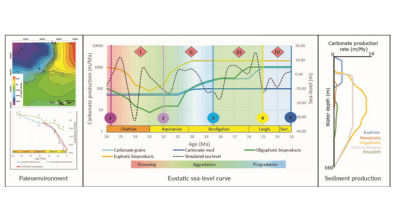GO-Forward
project
The GO-Forward project represents a paradigm shift in geothermal exploration, utilising machine learning algorithms and artificial intelligence to transform traditional data-driven workflows into process-based modelling approaches. The methodology combines computational methods with forward modelling techniques to accurately predict geothermal reservoir properties, reducing exploration risks and optimising resource development.
.png)
Process-based innovation
GO-Forward integrates knowledge of geological history with computational intelligence and data assimilation to forecast present-day reservoir properties. Its algorithms simulate geological processes rather than relying solely on traditional geostatistical extrapolation.
Core technologies

Machine learning
algorithms
ML-based computational methods enhance existing subsurface information for calibration, uncertainty quantification, and data assimilation in geothermal reservoir assessment.

Forward modelling
approaches
Three forward modelling approaches developed integrating open-source and commercial tools: Stratigraphic Forward Modelling (SFM), Diagenetic Forward Modelling (DFM), and Forward Fracture Modelling (FFM).

Techno-economic
performance analysis
Use physics-based machine learning approaches to create surrogate models allowing global sensitivity analyses and assessments of pre-drill POS(Probability of Success) and NPV (Net Present Value).
Expected project outcomes
The GO-Forward project's computational solutions would deliver outcomes for the geothermal industry:
Enhanced decision making: process-based approaches improve geothermal reservoir evaluation with limited data
Risk reduction: Algorithms minimise exploration uncertainties and unsuccessful drilling
Accessibility: Algorithms & related software will be open-sourced
Predictive capability: Enhanced reservoir property prediction capabilities
Promote public awareness: Developing new approaches to include more efficient public participation and stakeholder dialogues

Applications

Stratigraphic modelling
Algorithms predict sedimentary rock formation processes, enabling reservoir characterisation through geological process simulation.

Diagenetic analysis
Systems model physicochemical processes that lead to rock formation and alteration, providing insights for geothermal reservoir evaluation.

Fracture network modelling
Computational methods simulate the nucleation, growth, and propagation of fracture networks based on geological history and tectonic deformation events.

European Union Research Consortium
The international consortium brings together 12 European institutions specialising in artificial intelligence, machine learning, and geothermal research across Germany, Austria, Denmark, Netherlands, Spain, Switzerland, Italy, and the United Kingdom.












EU Horizon Europe Programme
This project is funded by the European Union under Horizon Europe programme (Grant No. 101147618) Call: HORIZON-CL5-2023-D3-02 - Advanced exploration technologies for geothermal resources

.png)
Swiss Federal support
Swiss Geo Energy receives research funding from the Swiss State Secretariat for Education, Research and Innovation (SERI) for this geothermal project.
Discover Switzerland's geothermal opportunity
Partner with Swiss Geo Energy's systematic clean energy development, where established subsurface expertise creates innovative geothermal solutions. Our comprehensive portfolio scales through three strategic phases—proof of concept, expansion, diversification—delivering consistent returns while driving Switzerland's Energy Transition forward.

